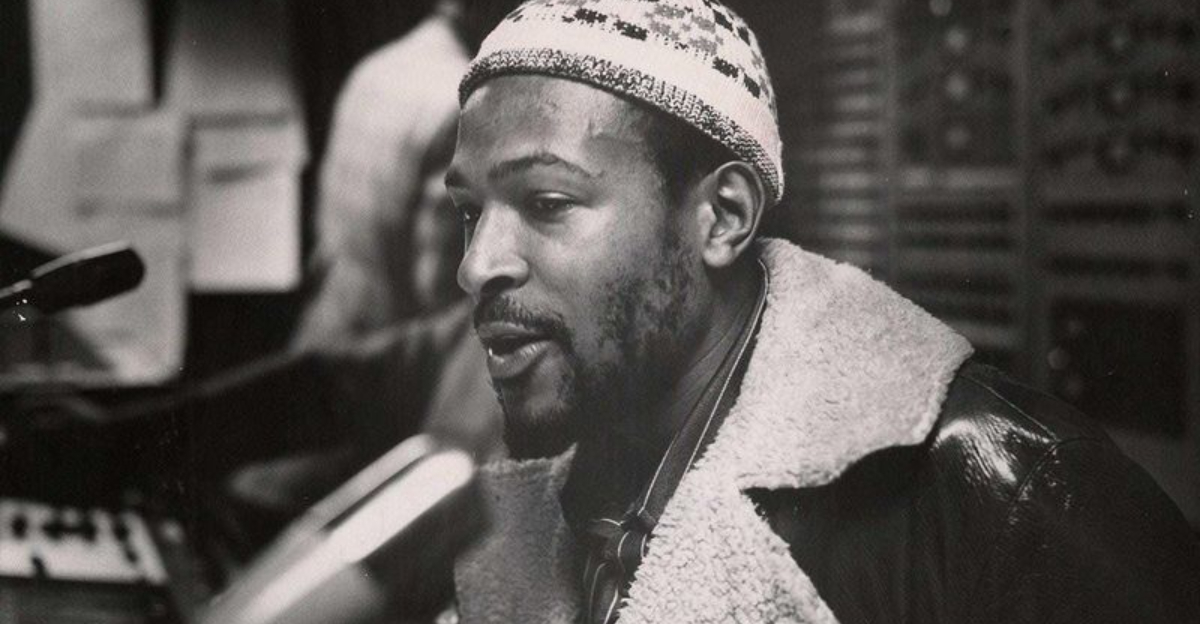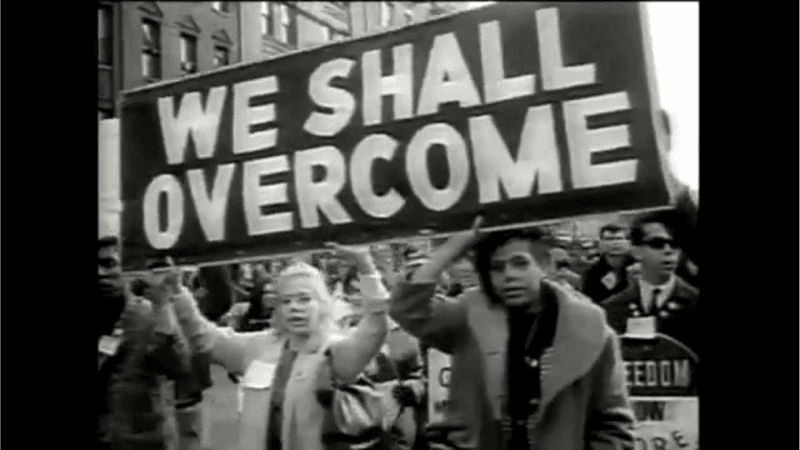Explore the powerful and resonant realm of Black protest songs that have shaped history, influenced movements, and spoken directly to the struggles and triumphs of Black communities. These 18 songs transcend time, offering messages that are as crucial today as when they were first heard.
1. “We Shall Overcome”
“We Shall Overcome” remains a cornerstone of civil rights movements, echoing courage and unity. Its melody, born from African American spirituals, resonates with a deep sense of hope. Though often sanitized in modern contexts, the song’s radical roots demand acknowledgment. Picture a mass of souls, driven by dreams of justice, gathered in solidarity. While its repetition in feel-good contexts might dull its potency, the song’s essence remains powerful. Its echoes of endurance remind us of the relentless pursuit for equality. In its heart, a promise of overcoming insurmountable odds, capturing a universal yearning for freedom.
2. “Blowin’ in the Wind” – Bob Dylan
Bob Dylan’s “Blowin’ in the Wind” poses timeless questions of justice. While celebrated, its universal vagueness sometimes overshadows raw, direct protest music from Black artists. Imagine a generation seeking answers, carried by Dylan’s poignant inquiries, yet yearning for specificity. The song, though embraced widely, highlights contrasts in the civil rights narrative, juxtaposing it with the unvarnished truths shared by Black voices. Despite its fame, the song’s poetic ambiguity can sometimes deflect from the urgency of immediate struggles. Still, its simple melody endures, a gentle reminder of the winds of change.
3. “Imagine” – John Lennon
John Lennon’s “Imagine” dreams of unity, a world free from barriers. However, its utopian vision occasionally overlooks the grit of systemic challenges. Picture Lennon at his piano, crafting an anthem of idealism that resonates across generations. While touching, some criticize its detachment from the lived struggles of marginalized communities. The melody soothes, yet the lyrics’ lofty aspirations can feel distant from urgent civil rights battles. Despite its overplay at progressive gatherings, its call for a borderless world continues to inspire hope, inviting listeners to envision harmony.
4. “Redemption Song” – Bob Marley
Bob Marley’s “Redemption Song” echoes liberation, urging listeners to emancipate from mental slavery. Despite its inspirational nature, frequent use sometimes strips away its revolutionary spirit. Envision Marley, guitar in hand, channeling historical struggles into melody. The song’s powerful lyrics, while often seen as merely inspirational, are rooted in deep resistance. Its overuse may dilute its revolutionary essence, yet Marley’s legacy remains intact. Each chord strums a reminder of enduring battles and the quest for freedom. In its heart, a call to action, resonant and vital.
5. “This Land Is Your Land” – Woody Guthrie
Woody Guthrie’s “This Land Is Your Land” critiques American inequality, often mistaken as a simple patriotic melody. Picture Guthrie, guitar in hand, questioning the American dream with every strum. The song’s origins lie in defiance, challenging notions of ownership and privilege. Yet, its transformation into a singalong overlooks its critical edges. Despite its misconceptions, Guthrie’s words persist as a testament to the unfulfilled promises of freedom and equality. Its verses, while often softened in public forums, still carry the weight of social critique and activism.
6. “Strange Fruit” – Billie Holiday (1939)
Billie Holiday’s “Strange Fruit” confronts the horror of lynching with haunting clarity. Its chilling imagery forces listeners to face America’s cruel racial past. Picture Holiday, voice trembling with pain, delivering each line in a dim club. The rawness of her performance captures the terror and injustice faced by Black communities. As the song unfolds, its stark narrative leaves an indelible mark, a visceral reminder of the brutality endured. Despite its discomfort, “Strange Fruit” remains a powerful testament to the fight against racial violence, echoing through history.
7. “Mississippi Goddam” – Nina Simone (1964)
Nina Simone’s “Mississippi Goddam” channels fury and frustration, rejecting slow progress in civil rights. Written in response to racial violence, Simone’s voice cuts through apathy, demanding justice. Visualize her at the piano, eyes ablaze, delivering each line with unwavering conviction. The song’s biting satire and raw emotion reflect the urgency of the 1960s civil rights landscape. Despite initial backlash, its message resonates, challenging complacency and spotlighting systemic racism. Simone’s anthem is a timeless call to action, urging society to confront uncomfortable truths with determination.
8. “A Change Is Gonna Come” – Sam Cooke (1964)
Sam Cooke’s “A Change Is Gonna Come” embodies hope and resilience, born from personal experiences of racism. Its soulful melody and poignant lyrics became a civil rights anthem. Picture Cooke, voice full of longing, enveloping listeners in a warm embrace of optimism. The song’s promise of change offers solace amid turmoil, inspiring countless generations. Despite the struggles it addresses, its hopeful undercurrent continues to uplift. Cooke’s legacy endures through this timeless ballad, a testament to enduring hope in the face of adversity, capturing timeless human spirit.
9. “Freedom” – The Isley Brothers (1970)
The Isley Brothers’ “Freedom” is a riveting call for liberation, seamlessly blending funk with social consciousness. Envision the brothers, electrifying the stage with their dynamic presence, as the music pulses with revolutionary fervor. The song’s raw energy captures the zeitgeist of a turbulent era, challenging listeners to envision a world free from oppression. Its rhythmic intensity and bold message drive a powerful demand for change, as funk beats underscore cries for justice. Despite being lesser-known, “Freedom” stands as a testament to resilience, echoing the unyielding spirit of liberation movements.
10. “The Revolution Will Not Be Televised” – Gil Scott-Heron (1971)
Gil Scott-Heron’s “The Revolution Will Not Be Televised” is a spoken-word masterpiece, critiquing media complacency and urging direct action. Picture Scott-Heron, with a commanding presence, delivering each line with precision and passion. The piece’s sharp wit and insightful commentary highlight the disconnect between media portrayal and real activism. Its rhythm and power resonate, challenging audiences to enact change beyond screens. Despite its age, the message remains relevant, encouraging listeners to participate actively in societal transformation. Scott-Heron’s work endures as a call to arms, sharp and unyielding.
11. “What’s Going On” – Marvin Gaye (1971)
Marvin Gaye’s “What’s Going On” is a soulful plea for peace and understanding. Born from the tumult of the Vietnam War, its soothing melody contrasts with its urgent message. Envision Gaye, in the studio, pouring emotion into every note, crafting an anthem that transcends time. The song’s reflective lyrics address social upheaval, urging compassion and empathy. Despite its gentle rhythm, the call for change remains powerful, echoing through decades. Gaye’s legacy, captured in this masterpiece, speaks to the enduring need for dialogue and equality, resonating with timeless relevance.
12. “Fight the Power” – The Last Poets (1971, later popularized by Public Enemy in 1989)
“Fight the Power” by The Last Poets is a militant call against systemic oppression, laying groundwork for future protest music. Picture the poets, fervently delivering verses that challenge societal norms, igniting a spark of resistance. Their raw energy and unflinching words demand attention, blending rhythm with revolutionary zeal. Though later popularized by Public Enemy, the original version’s urgency and fervor remain unparalleled. Its legacy, rooted in spoken word, continues to inspire activism, highlighting the transformative power of art. Each line serves as a battle cry against injustice, potent and enduring.
13. “Slavery Days” – Burning Spear (1975)
Burning Spear’s “Slavery Days” connects past horrors to ongoing struggles, using reggae as a vessel for remembrance and resistance. Picture Burning Spear, voice rich with history, delivering each line with heartfelt conviction. The song’s rhythmic pulse and evocative lyrics serve as a reminder of enduring injustices. Its messages of resilience and remembrance resonate deeply, urging listeners to acknowledge history while pushing for progress. Despite its roots in the past, the song’s relevance endures, bridging generations. “Slavery Days” is a testament to the power of memory in the fight for justice.
14. “Biko” – Peter Tosh (1977)
Peter Tosh’s “Biko” pays homage to Steve Biko, weaving reggae with calls for global solidarity against apartheid. Envision Tosh, guitar in hand, channeling the spirit of resistance through every chord. The song’s powerful narrative demands attention, highlighting Biko’s legacy and urging international action. Its reggae beats underscore the urgency of solidarity, inviting listeners to join the fight. Despite the years, “Biko” remains a potent tribute to those who sacrificed for freedom. Tosh’s tribute echoes across borders, a relentless call for unity and justice, resonating with unwavering strength.
15. “Fuck tha Police” – N.W.A (1988)
N.W.A’s “Fuck tha Police” is a raw, defiant track exposing police brutality and racial profiling. Picture the group, driven by anger, delivering verses that demand attention and spark debate. Their boldness and unapologetic lyrics challenge authority, resonating with those marginalized by systemic injustice. While controversial, the song’s power lies in its unfiltered truth, offering a voice to those silenced. Despite its explicit content, the anthem remains a critical commentary on law enforcement practices, igniting discussions on race and justice. Each beat reverberates with resistance and defiance.
16. “Alright” – Kendrick Lamar (2015)
Kendrick Lamar’s “Alright” has become a modern anthem for perseverance amid adversity, embraced by the Black Lives Matter movement. Envision Lamar, commanding the stage, his words fueling hope and resilience. The song’s upbeat rhythm contrasts with its serious themes, offering solace in turbulent times. Its chorus, a mantra of survival, resonates deeply with those fighting systemic oppression. Despite challenges, “Alright” exudes optimism, urging listeners to endure. Lamar’s impactful lyrics and dynamic delivery make it a powerful symbol of strength, capturing the spirit of contemporary resistance.
17. “Formation” – Beyoncé (2016)
Beyoncé’s “Formation” celebrates Black culture with bold political statements on race and police brutality. Picture her commanding a stage, an icon of strength and grace, as visuals amplify her message. The song’s infectious beat and unapologetic lyrics challenge narratives, empowering listeners to embrace their identity. Its powerful imagery and cultural references resonate, sparking dialogue on important issues. Despite its commercial success, “Formation” remains a potent call to action, urging societal change. Beyoncé’s artistry shines, blending entertainment with activism, capturing a movement’s essence with fierce energy.
18. “I Can’t Breathe” – H.E.R. (2020)
H.E.R.’s “I Can’t Breathe” channels grief into activism, responding to the police killings of George Floyd and Eric Garner. Visualize H.E.R., guitar in hand, her voice blending sorrow with resolve. The song’s poignant lyrics capture the collective pain and demand for justice, resonating deeply with listeners. Its haunting melody echoes the cries of those lost, urging society to confront systemic racism. Despite its somber tone, “I Can’t Breathe” empowers, reminding audiences of the power of voice and action. H.E.R.’s heartfelt performance stands as a tribute to resilience and change.


















